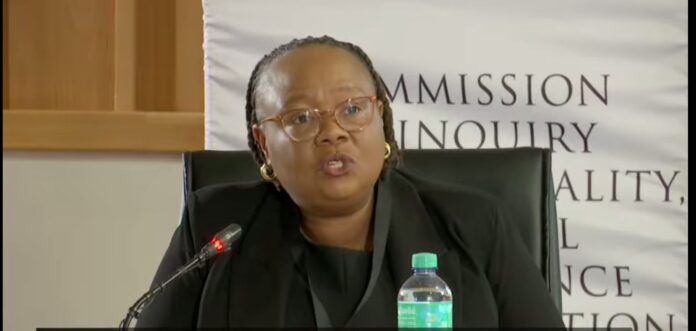Police Minister Senzo Mchunu’s decision to disband the KwaZulu-Natal (KZN) SAPS political killings task team (PKTT) was “destructive” and “counterproductive”.
This was revealed on Friday by Adv Elaine Harrison, who is the National Prosecuting Authority (NPA)’s Director of Public Prosecutions in KZN.
Harrison was speaking on Friday during the seventh day of the Judicial Commission of Inquiry into criminality, political interference and corruption.
The commission’s public hearings are taking place at the Brigitte Mabandla Justice College in Pretoria. It is chaired by retired Constitutional Court Justice Mbuyiseli Madlanga.
Disbanding had destabilising effect
During her testimony on Friday, Harrison told evidence leader Adv Matthew Chaskalson SC that KZN SAPS political killings task team is an essential structure to combat politically-motivated crimes.
“Without the PKTT, political killings could gain momentum and destabilise the province and affect other provinces as well,” said Harrison.
She said she learned about Mchunu’s December 31 2024 disbandment letter on January 3 2025 through social media.
“I was on leave at the time when I learned about the letter on social media. I regarded it as fake news. When I returned to work after my leave, I was informed by my deputy Adv Xaba that the prosecutorial team was informed by General [Dumisani] Khumalo that we cannot continue with cases of the PKTT but only with cases that have been enrolled in court.
“I did not receive any formal communication to my office about the disbandment,” said Harrison.
Khumalo is the SAPS national head of crime intelligence. He is the project leader of the PKTT.
Execution of warrants was affected
She said in May, KZN police commissioner Lt-Gen Nhlanhla Mkhwanazi informed her through a letter that the police are unable to execute warrants of arrests in certain PKTT cases because 121 PKTT case dockets have been taken from KZN to the SAPS head office in Pretoria.
Harrison said Xaba told her that deputy national commissioner of police for crime detection, Lt-Gen Shadrack Sibiya, telephonically informed Khumalo to take the 121 PKTT dockets to Pretoria.
Due to Sibiya’s instruction, Harrison said Xaba informed her that Khumalo said the PKTT and the NPA in KZN can only deal with decision dockets and dockets that are court-going matters.
She said Khumalo informed them that they can no longer deal with new matters.
Harrison said the removal of the 121 dockets negatively affected the joint work of the PKTT and the NPA in KZN.
“The removal of the 121 dockets affected cases that were not on the court roll. It affected ongoing investigations. There were many cases already on the court roll, ready for trial. Some of the dockets already had warrants of arrest. This removal affected our investigations,” said Harrison.
Investigators taken aback
“We lost about three months of investigations due to the 121 dockets being taken away… The minister’s disbandment decision was counterproductive and destructive. As the NPA we are victim-centred when we do our work. To say to us we must immediately be disbanded does not make sense.
“The prosecutors and the task team were successful and are still working well. We are working on the premise that the PKTT has not been disbanded,” said Harrison.
Harrison concluded her testimony on Friday. She is the commission’s fourth witness.
Before the adjournment of Friday’s proceedings, Madlanga said Khumalo will be testifying on Monday from 9.30am.
The commission heard testimony from Maj-Gen Petronella van Rooyen on Thursday. Van Rooyen is the head of governance, legislation and policy at the legal services division of the SAPS. She was giving expert testimony on the legislative framework governing the SAPS.
Masemola testified on Monday and Tuesday.
Explosive media briefing
The commission was established by President Cyril Ramaphosa on July 13 after Mkhwanazi’s explosive media briefing on July 6.
During the briefing, Mkhwanazi said politicians in parliament, police officers, metro police officers, correctional service officials, prosecutors and members of the judiciary are part of a criminal syndicate in Gauteng. He added that they are controlled by drug cartels and business people in Gauteng.




